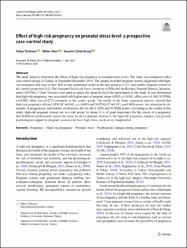Effect of high-risk pregnancy on prenatal stress level: A prospective case-control study

View/
Access
info:eu-repo/semantics/openAccesshttp://creativecommons.org/licenses/by/3.0/us/Date
2024Metadata
Show full item recordAbstract
The study aimed to determine the effects of high-risk pregnancy on prenatal stress levels. The study was conducted with a
case-control design in Turkey in September-December 2019. The sample included pregnant women diagnosed with highrisk pregnancy and were at their 36th or later gestational weeks as the case group (n=121) and healthy pregnant women as
the control group (n=245). The Antenatal Perceived Stress Inventory (APSI) and the Revised Prenatal Distress Questionnaire (NUPDQ-17 Item Version) were used to assess the stress levels of the participants in the study. It was determined
that high-risk pregnancy was associated with higher rates of prenatal stress (APSI: p<0.001, effect size=0.388; NUPDQ:
p=0.002, effect size=0.272) compared to the control group. The results of the linear regression analysis showed that
high-risk pregnancy affected APSI (R2=0.043, p<0.001) and NUPDQ (R2=0.033, p=0.009) scores, but education levels,
number of pregnancies, and number of abortions did not affect APSI and NUPDQ scores. According to the results of this
study, high-risk pregnant women are in a risk group for stress. It is of great importance for the course of a pregnancy
that healthcare professionals assess the stress levels of pregnant women in the high-risk pregnancy category and provide
psychological support to pregnant women who have high stress levels or are hospitalized.
Source
Current PsychologyVolume
43Issue
27Collections
The following license files are associated with this item:


















